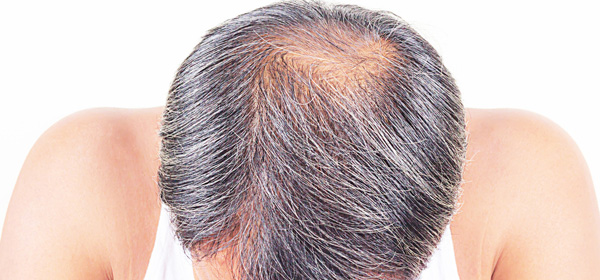Thinning hair is a natural occurrence for both men and women. About half of all people will start to experience some form of hair loss by the age of 50.
There are a number of factors that contribute to thinning hair. These can range from lifestyle, including diet and stress, to health conditions and deficiencies. If your hair is beginning to thin, it might be time to revise your habits and health.
Possible reasons for thinning hair include:
- physical stress
- emotional stress
- too much vitamin A
- lack of protein
- vitamin B deficiency
- anaemia
- hyperthyroidism
- male pattern baldness (in men)
- heredity
- female hormones changes
- autoimmune-related hair loss
- dramatic weight loss
- polycystic ovary syndrome
- some medicines, including antidepressants and blood thinners
- over-styling, over-washing and using too many products
- ageing.
A visit to the GP can help pinpoint what is going on under your scalp.
It may surprise you to learn that your head contains anywhere from 100,000 to 150,000 hairs and that you lose between 50 and 100 hairs each day. That might sound like a lot but in people with normal hair regrowth, it’s balanced out by the continual regeneration of new hairs. But what if your hair is thinning and doesn’t seem to be growing back? The good news is that, in many cases, hair loss can be reversed.
Try these five effective tips for treating thinning hair.
1. Diet – healthy hair depends on a healthy diet, so if your hair is starting to fall out, you may need to increase your intake of foods rich in protein, iron, zinc and vitamin B12. These can be found in lean meats, leafy greens, nuts, beans and fish.
2. Blood tests – having your blood work checked out by a GP can test your ferritin (amount of iron in your blood) and your vitamin D levels. If these levels are low, it may be the reason for your thinning hair. Treatment is as simple as a supplement.
3. Stress – stress, depression and anxiety can all play a role in thinning hair. If you’re the kind of person to spread yourself too thin, consider taking time out to breathe, relax and allow your body to regenerate. Try going for a walk, delegating some of your chores, going to bed earlier, or speaking to someone about your anxieties.
4. Supplements and medicines – in some cases, taking a supplement or medicine can help. Ginkgo biloba is an herb used to discourage thinning hair by strengthening the hair shaft and promoting blood flow. Likewise, Minoxidil, the active ingredient in Regaine, is clinically proven to help reverse hair loss and stimulate new growth.
5. Hormone help – if hair loss continues to recur even after the above treatments, you can consider a hormonal option. These options will differ among men and women, and your GP can advise you on which is best for you. Cortisone shots are an option too. For this, a shot of the steroid is injected directly into the scalp to block the hormone response for inducing thinning hair. This may hurt but it’s effective. People with inflammatory scalp disease consider this treatment to be the most successful.
Read more at WebMD.com
Related articles:
What is causing my hair loss?
How to prevent male hair loss
Nine tricks for thicker hair

